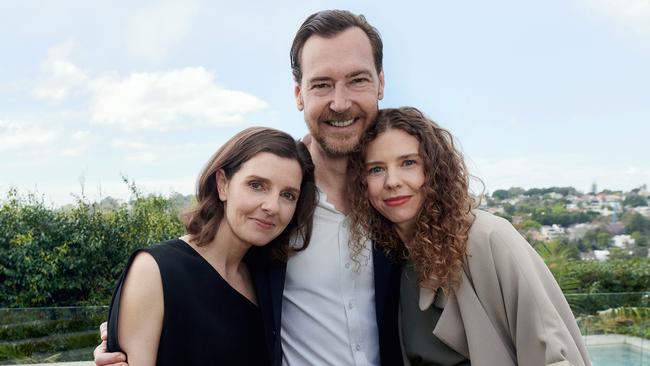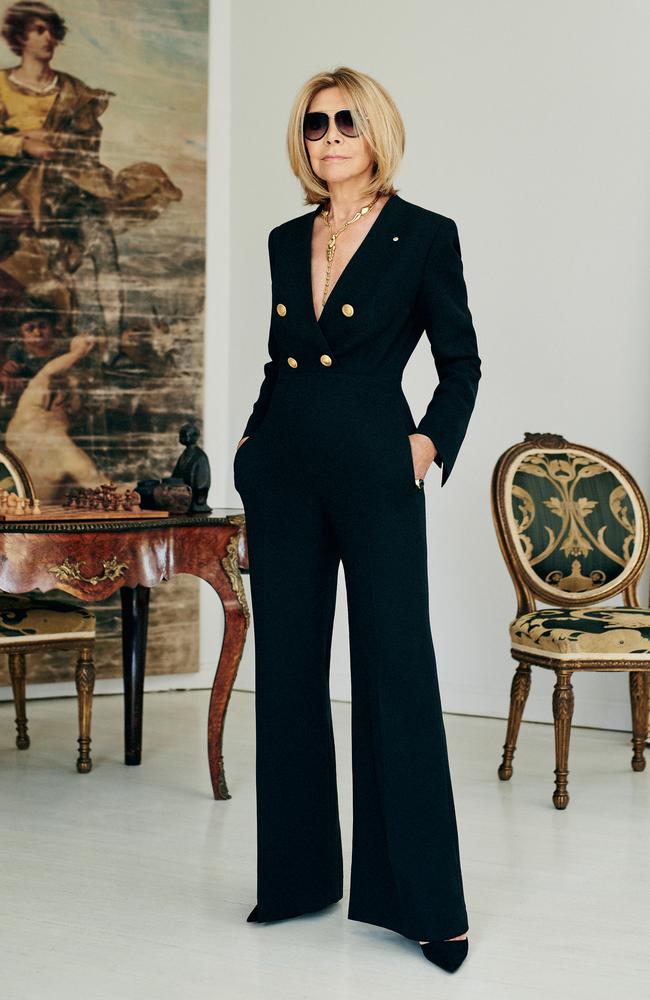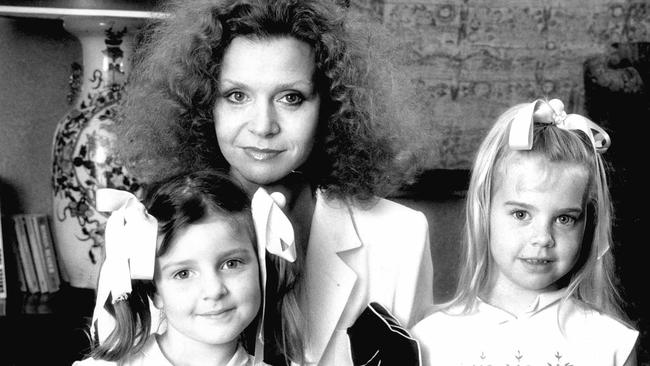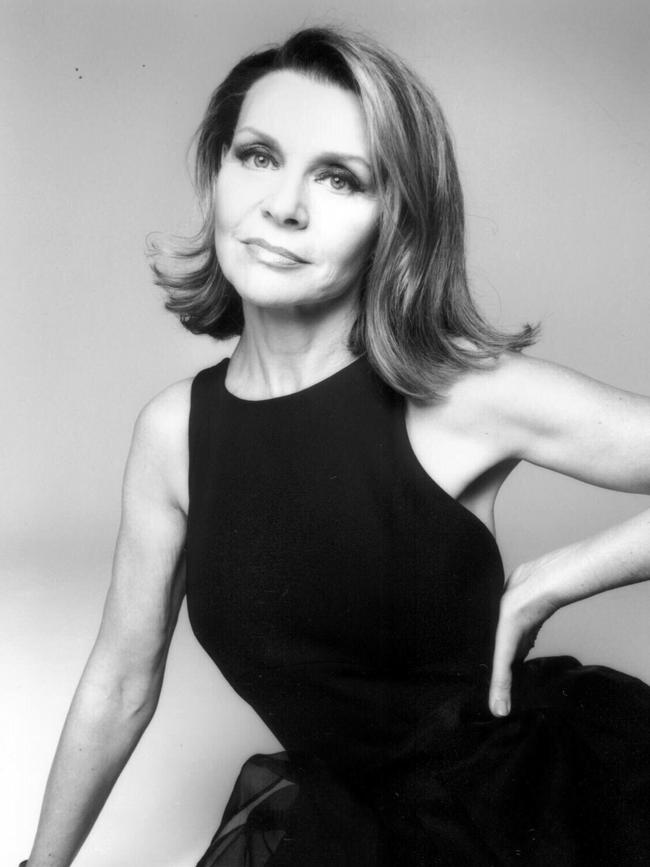Carla Zampatti ‘saw women running the world’
Carla Zampatti’s family reflect on their mother’s formidable achievements and long-lasting legacy in a heartfelt interview with Vogue Australia editor-in-chief Edwina McCann.

Setting aside her formidable achievements in the cultural life of this country, Carla Zampatti AC will always be known as someone who paid it forward. “I’d like to be remembered as someone who helped women achieve,” she once said.
The Italian émigré who arrived from the small town of Lovero, Italy to country Western Australia at age nine did just that. From 1965 through to today, her clothes offer women a powerful brand of modern elegance and will live on alongside the Carla Zampatti Foundation Design Award for emerging designers, the runway at Australian fashion week named in her honour, as well as a major retrospective exhibition chronicling her life’s work at Sydney’s Powerhouse, opening this November.
When she passed away at age 78 in April last year, her nine grandchildren and three surviving children, Alexander Schuman and Allegra and Bianca Spender, mourned alongside a country – from the influential in politics, business and the arts, to women she encountered only briefly but touched nonetheless.
Her three children sat down with Vogue editor-in-chief Edwina McCann to discuss memories of their mother and her influence looking ahead.
Though taking different paths – Alexander through the family business as CEO, Allegra in politics making a bid for the federal Sydney seat of Wentworth, and Bianca treading closely in her footsteps through design – each are carrying forth different facets of her legacy and, united, safeguarding its future.
–
EDWINA McCANN: Alex, beginning with you. How did you see Carla transcend fashion and really influence Australian life in all aspects including culture, arts, business, and even politics?
ALEXANDER SCHUMAN: “She was able to transcend fashion. She had this crossover of being a creative but someone who had a really strong business mind. She won lots of fashion prizes and accolades in life, but the first big prize she won was Australian Businesswoman of the Year. That’s what she really brought to all of her dealings in filling philanthropic, government and business boards – the mixture of both. She was always pressing others to be a lot more creative or business minded and was quite outspoken about it wherever she went.”
EM: Bianca, on that note, what do you think really gave your mother the ability to see where women would be one day, what they could become, especially given the time she grew up in?
BIANCA SPENDER: “For Mum, in her formative years where she grew up in Italy, her brothers and her mother ran the farm and her father was in Australia, so she saw women running the world. She would carry as much up the hill as both her brothers could and had this fierce independent spirit. Then coming to Australia and seeing a land of such opportunity, it made her say women can be everything. She was not content in the roles that were available for women and didn’t think that anyone should be.”
EM: Allegra, how did it change your perception of what a powerful woman was growing up?
ALLEGRA SPENDER: “Mum loved women running things. She would prefer if a business was run by a woman. That was her. She was really proud of what women could do. I think a lot of that came from her own experience because she had some very difficult times personally and I think through those she learned how strong she could be. For Mum, and actually I think for me personally, power is that freedom and independence and the ability to make your own choices, whatever those choices are. It’s actually about saying, ‘Can I do what I believe I can?’ and have the confidence to pursue what is important to you, that I think is power.”

EM: Bianca, your mother had such a refined sense of beauty and aesthetics. Did that really influence you as a young girl?
BIANCA: “I have so many visual memories of spaces, of moments. We had magnolias, we had palms – it was the 70s, and she would take half a tree and stick it in a vase and make a sculpture out of it. Allegra and I were talking about how she would line up pears perfectly on a white platter and leave it on a table. So, there was always a visual feast … Growing up in her world, we were always in touch with that beauty, and we were allowed to touch things … like sculptures, the paintings, the beautiful tables. And then another layer came in when she would take us to art galleries, or the theatre. It was just this world where everything was so rich, and classical music was always playing.”
EM: I think that was one of the things about your mother, she was incredibly generous, but also so tactile.
BIANCA: “And so cuddly. If you sat on the couch, she would say, ‘Come here darling’, and put your hands in hers … she had such a genuine affection for people, for creativity, for curiosity – for anyone who was dreaming, pushing, creating, moving forward.” EM: She used that to lift people up, with the Carla Zampatti Foundation Design Award. Did you witness that?
AS: “Soon after she passed away, someone wrote to me on LinkedIn, a woman I hadn’t met before. She told me the story about how Mum and her had a coffee and so she had introduced her to a chief executive woman – she had set her up with a mentor. Mum had been a champion for her. But that is actually one of Mum’s greatest gifts; she truly supported women and she truly wanted women to succeed.”
EM: It went well beyond women. She was incredibly generous in terms of philanthropy. Tell us a bit about her philanthropic work.

ALLEGRA: “Mum was a migrant when she came to Australia. She didn’t speak English and left school at 14, so had a deep passion for migrants and for the underdog, for the people who were striving and wanted to be something they were not yet … I run a charity, which brings together students from low socio-economic backgrounds and mentors, and some of these kids are refugees, or recently arrived migrants, and she came to one of our events and said: ‘These kids, they’re just like me. I see myself in all of them because they’re kids who want to be the best that they possibly can be but have lots of hurdles, but aren’t afraid of them.’ And that’s what she was like.”
EM: How do you think that influenced her clothes, her designs?
ALLEGRA: “I think her clothes are about making women feel confident, and feel beautiful, so they can take on the world. And whatever challenge, if you’re wearing Carla Zampatti, you’re feeling great, that’s what she wanted.”
EM: And what were her hopes for the Australian fashion industry?
BIANCA: “She saw that there was a lot of talent in the industry, but we were always outward-looking … There used to be a thing about: ‘Oh, you know, Australian-made didn’t really count.’ Everyone wanted European designers. She really wanted Australians to recognise the talent in the industry and be recognised by the world because we hit way above our weight.”
AS: “She wanted young designers to learn how to run businesses, because she saw a lot of talented young people coming up in the industry but they didn’t have the skills to be able to turn it into a viable business. And that was really heartbreaking, because she’d been that young designer trying to make it work.”
EM: Quentin Bryce was a dear friend of hers and aptly described her as an unsurpassed success. How do you keep that legacy alive? What do you think she would want you all to do?
ALLEGRA: “Follow her advice? [Laughs.] You know, we’ve thought a lot about this. For us, when we lost Mum, that’s been the thing that we’re actually clearest on: her legacy and what we want to live on. It’s about her values, and her values were about women and empowering women, it was about the joy and beauty of multicultural Australia and supporting people to thrive. And it was about creativity. Those are the things that we see as really our responsibility, to build on that. That’s how we grew up and I think those are the values that we want to take forward.”
EM: And Alex, of course, the brand lives on. How are you planning on moving it forward? What comes next?

AS: “I think Mum was really best known for making things that last, or you saw that in her clothes. And I think that she really had a long-sighted view of the business as well … she brought us into the business from a very young age; when everyone else at school was on holidays, we were toiling away. For her, it was her life’s work, but it was also her other child. She really did see us as being the next chapter.”
EM: This has been a tough period. How has it galvanised you?
BIANCA: “Alex and I have talked a lot about courage and I think we all knew Mum had that definiteness. She didn’t need you to agree with her to know she was right – she would just keep going until you realised she was right. [Laughs.] And she also needed you to have an opinion. She didn’t want yes-sayers around either. She really wanted to get in there and have a vivid discussion whether it be about politics, art, a haircut – it could be anything. Everything had to have a point of view and purpose. Asking: ‘What are you doing? What is the impact of what you’re doing?’”
EM: She was also a wonderful grandmother.
BIANCA: “She loved family moments, she could be whoever in the role she played in the week, but on the weekend she wore no make-up, no shoes. The door was always open. The oven was always ready to have croissants put in it. She revelled in just simple pleasures.”
EM: As a designer, how did she make you a better creative?
BIANCA: “It’s a really touching question because it’s probably where I feel her most and she always was about how the clothes make you feel. I always have a theme every season and she’d be like: ‘I don’t care. How does it make you feel? Put it on. Where are you going [in it]? What are you doing?’ And now, it’s become such, let’s say, a felt sense whenever I drape on my body.”
“Her values were about women empowering women, it was about the joy and beauty of multicultural Australia and supporting people to thrive”
EM: Allegra, how does your mother’s influence and memory bolster your bid for election?
ALLEGRA: “I have thought of her so much through this campaign. Mum had enormous courage and said her only regrets were the things she didn’t say yes to. That really helped in giving me the courage to run. Her values of supporting women, of championing migrants, of the opportunities that business creates for people have shaped my policies … She loved action, not words. I am very focused on what I can do and make better, if I win.”
EM: There must be joyful moments seeing her legacy at work around you and the impact she’s had on Australian fashion and Australian business, the arts, and your own children?
AS: “She’s a quintessentially Australian migrant success story. And I always thought that she was like that, but after she died, we read so many of these international obituaries where she was in foreign language newspapers, particularly in Europe and in American newspapers. And I thought this is quite an amazing thing.”
BIANCA: “She just managed to touch so many people but never doing it for any accolades or recognition … as a fashion designer, you’re in it for the feeling, you’re in it for the way that you can transport, support, evolve, hold, comfort, inspire people. You get to shroud them, you get to hold them, and she held women up. And it was the most beautiful thing – that they felt her holding them up.”
This article appears in the May 2022 edition of Vogue Australia, on newsstands now.

To join the conversation, please log in. Don't have an account? Register
Join the conversation, you are commenting as Logout